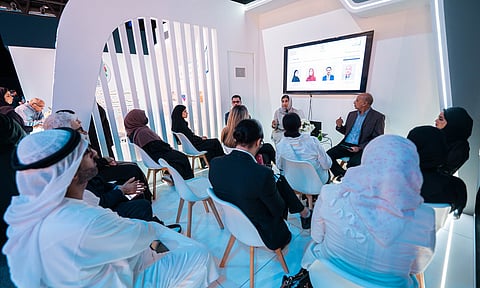IGCF 2025: Sharjah experts call for new era of support for children with learning difficulties
Talks focus on transforming government communication into a tool for empowerment

The 14th International Government Communication Forum (IGCF) opened with a powerful message of hope for children with learning difficulties, shining a spotlight on how psychology, education, and media can come together to change lives.
The session, organised by the Sharjah Government Media Bureau (SGMB), brought together experts and specialists who urged governments, educators, and families to look beyond the challenges and see the potential of every child. The discussion focused on transforming government communication from a mere vehicle for information into a tool for empowerment — one that can help children and their families overcome stigma, unlock hidden talents, and find their place in society.
Dr. Maha Al Ali, child and adolescent psychiatrist, set the tone by reminding the audience that psychological well-being is the bedrock of learning.
“Self-confidence and a sense of emotional security are crucial for children with learning difficulties,” she said. “Early psychological intervention not only improves learning outcomes but also empowers children to integrate more successfully into society. The more these children feel safe and supported, the better they can learn, focus, and think critically — turning challenges into opportunities to show what they are capable of.”
For Ahmed Al Salem, head of academic intervention affairs at the Sharjah Center for Learning Difficulties, the key is not simply offering services but ensuring their quality.
“Children with learning difficulties are normal students who simply require a different approach to learning,” he said. “The difference lies in accurate diagnosis, qualified specialists, and customised educational plans that meet each child’s needs.”
He also highlighted the power of technology to make education more inclusive. He shared the success of the ‘self-advocacy’ programme, which teaches children to understand their rights and speak up for themselves, while also educating the wider community on how to support them. “Our goal is not just to provide services,” he added, “but to ensure they are innovative, effective, and accessible — so that children feel education is always within their reach.”
Dr. Elsayed Bekhit Darwish, professor at Zayed University’s College of Communication and Media Sciences, shifted the conversation to the role of the media, arguing that learning difficulties must be seen as a collective societal concern.
“Media narratives must highlight the strengths and capabilities of children with learning difficulties,” he said. “By changing how we talk about them, we can build a culture of inclusion, expand educational opportunities, and create pathways to employment.”
The panelists agreed that building a better future for children with learning difficulties requires a threefold approach: psychological security as the starting point, high-quality education and assistive technology as the tools, and responsible media communication as the amplifier. Together, they said, these elements can break down stereotypes and reshape public perceptions — allowing every child the chance to thrive.



